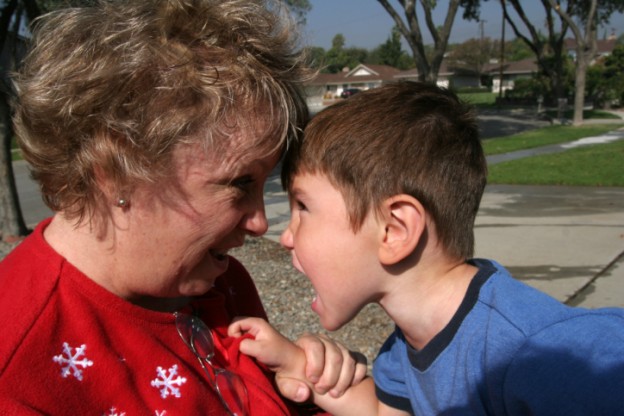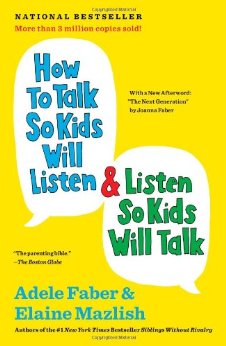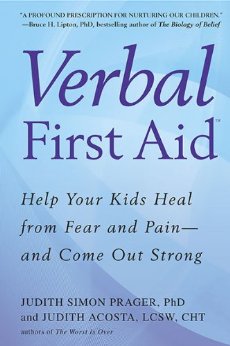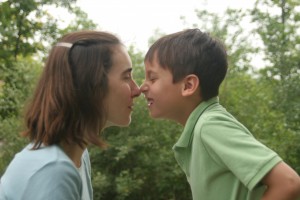
What Parents Do During A Meltdown
“Just calm down.”
"Snap out of it!"
“Stop screaming!”
"What is wrong with you? Are you high on something?"
“Focus.”
“Pull yourself together!”
"Serenity now!"
“Act normal for a change!”
We all know the wrong things to say during a loved one’s meltdown. But what’s the right thing to say or do - or is it better to say and do nothing during a meltdown?
This has been on my mind ever since my 6 year old son told me to remain quiet and calm during his older brother’s meltdown. “Talking makes him more upset, Mom.”
What to do during a meltdown
But I have the urge to DO something, anything, to help my child when he is deeply distressed. So I reflected upon what has worked for my family over the years, and then I asked other families what they do during meltdowns. Some of the common threads of these discussions are:
- find a safe location
- maintain a calm presence near the person who is having a meltdown
- allow enough time for the meltdown to run its course
Amelia W.: I feel like we're still trying to figure it out. For the most part he does not want to be touched and will sometimes bury himself under his cushions in the playroom. Tonight however, we played our new game. We go upstairs where we sleep-two queens pushed together on the floor- and throw or push pillows and blankets at each other. I also toss him on the bed and squish him. So essentially we practice heavy work and deep pressure.
Natalia E.: Do we know what initiated the tantrum? Where are we? What do we know from experience - or what can we observe going forward- that helps *our* child?
 I benefited hugely from reading "How to Talk So Your Kids Will Listen and Listen So Your Kids Will Talk." I'm sure nothing works for every child and in every situation, but I had great response when I was able to figure out what had instigated the tantrum and acknowledged it without trying to fix it. "It looks like you're sad that your brother got on the bus and you have to stay home." Less talking is more.
I benefited hugely from reading "How to Talk So Your Kids Will Listen and Listen So Your Kids Will Talk." I'm sure nothing works for every child and in every situation, but I had great response when I was able to figure out what had instigated the tantrum and acknowledged it without trying to fix it. "It looks like you're sad that your brother got on the bus and you have to stay home." Less talking is more.
Let the child correct you if they can/wish, if you get the "reason" wrong. Don't try to fix anything in the moment. Don't worry about what people around you think. All easier said than done in the early days.

2 more book suggestions, both by Judith Simon Prager: Owie Cadabra ‘s Verbal First Aid For Kids and Verbal First Aid: Help Your Kids Heal From Fear and Pain - And Come Out Strong. Great scripts for when a person is injured, which can be modified for other situations.
You asked about what to say, but I have to mention that what helped us most is homeopathy. Once we found the right one, I could give a dose of remedy and a tantrum would stop instantly. With long-term homeopathic treatment, the meltdowns vanished. Certainly, part of it was growth and maturity, but the effect of the remedy was too prompt and dramatic to discount.
Marla B.: Hardest thing to do is stay calm yourself when your kid melts down. But they feed off your energy. I try to go into efficient emergency crisis mode and turn off my stress emotions and go on autopilot. For Liza, although rare, this includes letting her know I'm physically in charge. Holding her arms firmly but not aggressively, so she can't bite herself or me! And saying calming things for both get and me. For example, "Liza, we can do this. We can get through this together. Try to calm down. Take deep breaths."
Amy S.: Washing hands in warm water or a bath when possible with Pascalite Clay, firm hugs with downward back rubs, singing and rocking while gently running my fingers along his face, jumping, high protein snacks as soon as a small upset occurs and every two hours regularly throughout the day, a cooler room (often heat adds to meltdowns), quiet places (so many times we've sat in the car for hours to just calm down), nature walks, looking at relaxing pictures, and harp music.
Lynn F.: We can be upset at home and have time to calm down in a separate room or next to me. The hardest part for us is getting so upset that we want to 'lash out' at those around us for how we feel.
Jacklyn B.: My 2 year old says the same statements over and over. I find holding her close and repeating what she's saying, letting her know I hear her, really helps her to calm down a bit. There are definitely times when she makes it clear that she does not want to be held or consoled, and I try to stay close by and available for when she is. For me, the hardest part is keeping myself centered and cool when her meltdowns are exceedingly long.
Ann Marie D.: I just tell George that I am walking away. If we're in public, I do the best I can.
Vera S.: For my daughter it's cold water with a straw. It's like magic! It doesn't really help with regular ol' crying, but she can very easily go from crying to hyperventilate-y. A cold drink of water sort of resets her breathing and physically cools down her sweaty self. The straw is just because it's hard for her not to spill when she's upset.
Maureen L.: For us, there is no one thing that always helps or always works. I listen to my gut in the midst of a meltdown and just try various things. Sometimes going outside in the cold in winter helps (or feeling the cold air from the freezer in summer), sometimes reflecting his feelings helps ("you are really upset because you wanted to put the straw in your cup!"), but sometimes redirecting him away from his feelings helps ("whoa! it rained earlier; there are some big puddles outside waiting for us!").
Sometimes deep pressure helps, but often I can't get close enough to him to offer that pressure (he'll fight me off). We try classical music, and if it's summer, putting him in sand usually helps (sensory input). We've tried baths, but he fights us too much. Usually for us, it's a matter of just waiting for him to calm down a little, offering loving words while he's going through it, and then when he's calmed down a bit, we can then offer more help like deep pressure, massages, baths, feeling slime, spinning, swinging, etc., in order to help him calm down fully.
What works for your family during a meltdown?



